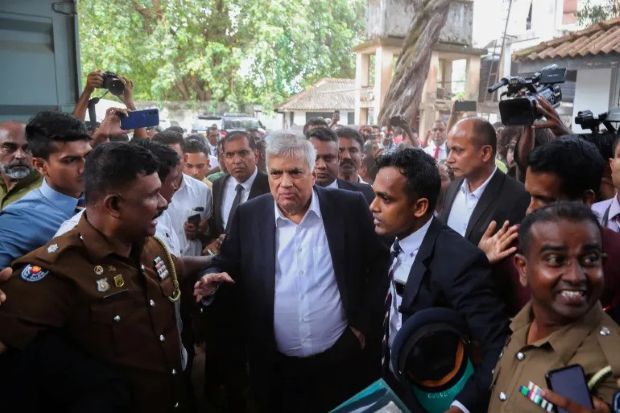Sri Lanka moved to end elite impunity with arrest of former president
By Thiruni Kelegama
Sri Lanka’s former president and six-time prime minister, Ranil Wickremesinghe, was arrested on August 22 for allegedly misusing state resources while in office. He is accused of using public funds to attend his wife’s graduation ceremony in London after an official visit to the US in 2023. Wickremesinghe has since been granted bail on a five-million-rupee (£12,300) bond.
His arrest represents one of the most consequential moments in Sri Lanka’s postcolonial history. It marks the first time a former head of state has ever been detained in Sri Lanka, shattering the longstanding assumption that those at the top of the country’s politics remain forever beyond the reach of the law.
The assumption of elite impunity was built on decades of precedent. This reached its apex under the Rajapaksa family, who dominated Sri Lankan politics between 2005 and 2022, as corruption was woven into the very fabric of governance.
The Rajapaksas captured state institutions, placing family members and loyalists in key positions across the bureaucracy, military and judiciary. Public wealth was also diverted for private gain. The certainty that those in power would remain beyond legal reach, regardless of the scale of abuse, became embedded in Sri Lanka’s political DNA.
That certainty cracked in 2022 when mass protests, commonly known as Aragalaya, swept the Rajapaksas from office. The following year, the Sri Lanka’s supreme court held the family responsible for bankrupting the state by mishandling the economy.
This was a landmark ruling, but one that had little material effect. The Rajapaksas were only condemned and not punished. Wickremesinghe’s arrest is different. It shows that accountability has moved beyond a single dynasty and now threatens the entire Sri Lankan political class.
The timing of the arrest deepens its significance. Sri Lanka is currently under an International Monetary Fund (IMF) bailout program to help stabilize its economy. It was negotiated by Wickremesinghe in the wake of bankruptcy and is now being carried forward by the National People’s Power (NPP) government.
The bailout loan comes with punitive terms. Higher taxes, subsidy cuts and shrinking public services are all being shouldered by ordinary citizens. They pay daily for a crisis born of elite misrule. In this context, elite accountability is not just symbolic, it is the bare minimum of justice.
Moment of truth
This moment is defining for the NPP government. Anura Kumara Dissanayake was elected in 2024 having pledged to prosecute corruption and abolish the executive presidency – the constitutional embodiment of unaccountable power since 1978. His government faces both opportunity and test in Wickremesinghe’s arrest.
Few individuals embodied establishment politics more fully than Wickremesinghe did. The immediate response to his arrest was telling. Three former presidents, Chandrika Kumaratunga, Mahinda Rajapaksa and Maithripala Sirisena, along with opposition leader Sajith Premadasa rushed to show solidarity with the detained ex-president. This suggests the old guard’s instinct for self-preservation remains strong.
If prosecutions prove selective, the NPP also risks echoing the very cynicism it sought to displace – wielding justice as a political weapon rather than institutionalizing it as a principle. While the government has already launched investigations into a broad swathe of former officials – from a member of the Rajapaksa dynasty to more than 20 ex-ministers – these early moves could be symbolic.
The real test lies with the Rajapaksas. Their rule was virtually synonymous with impunity. If they too are truly held to account, it would mark a genuine transformation from dynastic protection to the beginning of rule of law.
Such moves carry risks. Prosecutions may be dismissed as political vendetta, further polarizing Sri Lanka’s already fragmented society. The protests that erupted in Colombo following Wickremesinghe’s arrest offer early evidence of this dynamic.
But the danger of inaction is greater. To do nothing, after an economic collapse born of corruption and elite mismanagement, would reinforce public cynicism and effectively licence future impunity. It would tell citizens already enduring austerity that, once again, those at the top remain beyond reach.
Wickremesighe’s arrest also sends a signal beyond Sri Lanka’s borders. For years, the country’s reputation was defined by scandals and violations that went unpunished.
In 2015, for example, Sri Lanka’s central bank issued ten times the advertised amount of 30-year bonds at inflated interest rates. This cost the state an estimated 1.6 billion rupees (roughly £3.9 million) in excess losses. Then, several years later, no criminal proceedings were brought against senior officials for failing to act on intelligence warnings ahead of the 2019 Easter Sunday bombings that killed 269 people.
This pattern of impunity extended beyond domestic scandals. The UN Human Rights Council had passed multiple resolutions on Sri Lanka over alleged war crimes and enforced disappearances. Yet here too the state’s response remained the same. It made promises of accountability that never materialised.
The arrest of Wickremesinghe suggests this may be changing. It is a signal that Sri Lanka is finally serious about the rule of law – not just as a slogan, but as practice.
Sri Lanka’s myth of elite untouchability has cracked, but whether it shatters completely depends on what follows. While Wickremesinghe’s arrest is historic, lasting transformation requires institutions capable of sustained accountability.
The choice before the NPP is clear: accountability as a spectacle or as a system. Having paid the price of impunity, Sri Lankans may finally be positioned to demand its opposite.
–Thiruni Kelegama is a Lecturer in Modern South Asian Studies, Oxford School of Global and Area Studies., University of Oxford and this article was originally featured on theconversation.com



Comments are closed, but trackbacks and pingbacks are open.